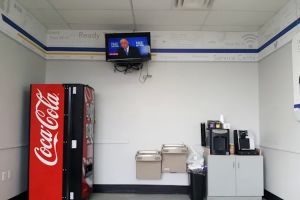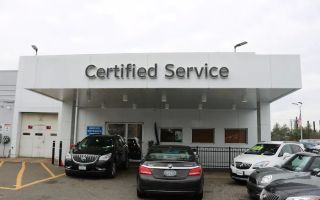How to Keep Your Car Battery in Top Condition
Car battery issues can strike at the most inconvenient times. Whether you're on the way to work, out for a long road trip, or heading home after a busy day, a dead or failing battery can leave you stranded. Fortunately, there are several practical steps you can take to prevent car battery problems and ensure your vehicle's battery stays in excellent working condition. In this article, we’ll cover how to identify common battery problems, the maintenance steps you should follow, and proactive strategies to keep your car’s battery from failing.

NTB-National Tire & Battery
6315 Prentiss School Dr, Canal Winchester, OH 43110, USA
1. Understanding Common Car Battery Problems
Before diving into the ways you can prevent battery problems, it's essential to understand what causes them in the first place. Car batteries are crucial for starting your engine and powering electrical components, but they can face a variety of issues as they age or due to external factors. Here are some of the most common problems drivers face:
- Dead Battery: This is the most common battery problem, where the battery simply doesn't hold a charge anymore. It usually happens when the battery is old, or it has been drained by leaving lights or electronics on.
- Corroded Terminals: Over time, the battery terminals can accumulate corrosion, which interferes with the flow of electricity. This leads to poor performance, and in some cases, the battery may not work at all.
- Parasitic Drain: Electrical components, such as alarms or interior lights, that continue to draw power from the battery after the vehicle is turned off can cause a parasitic drain, leading to a dead battery over time.
- Alternator Issues: The alternator is responsible for charging the battery while the engine is running. If it’s malfunctioning, the battery may not get charged properly, leading to a battery that drains quickly.
- Extreme Weather: Both extremely cold and hot weather conditions can negatively impact your car battery’s lifespan. Cold temperatures can cause the battery to lose its charge, while heat can cause the battery fluid to evaporate, damaging the internal components.
2. Essential Tips for Preventing Car Battery Issues
Now that we know the common causes of battery problems, let’s look at how you can prevent these issues from affecting your car. Here are some tips to help you extend your battery’s life and avoid those inconvenient breakdowns:
- Regularly Inspect the Battery: Routine battery inspections are crucial to detecting potential issues early. Check for signs of wear and tear, such as cracks, leaks, or corrosion around the battery terminals. If you notice any of these signs, it's time to replace the battery or clean the terminals.
- Clean the Battery Terminals: Corrosion on the battery terminals can prevent the proper flow of electricity to the engine. Regularly clean the terminals with a mixture of baking soda and water to prevent buildup. If you’re unsure how to do this, a mechanic can perform this maintenance during regular servicing.
- Keep the Battery Secure: A loose battery can lead to vibrations, which may cause internal damage. Ensure that the battery is properly secured in place to avoid damage caused by excessive movement, especially when driving over rough terrain.
- Avoid Short Rides: Short, frequent trips don’t allow your car’s alternator enough time to fully recharge the battery. When possible, try to take longer drives to ensure the battery is adequately charged.
- Turn Off Electronics: Always remember to turn off your car’s lights, radio, and other electrical components when the car is not in use. Leaving electronics on for an extended period can drain the battery quickly.
3. The Importance of Proper Battery Maintenance
Proper battery maintenance goes beyond just cleaning the terminals and ensuring it’s properly secured. A few additional maintenance tasks can help ensure your battery remains in good condition:
- Check the Battery Voltage: Every few months, it’s a good idea to check the voltage of your car battery using a multimeter. A healthy battery should read about 12.6 volts when the engine is off. If the reading is lower, your battery may be undercharging or near the end of its lifespan.
- Test the Alternator: Have your alternator tested regularly. A failing alternator can cause your battery to undercharge and eventually fail. Your mechanic can test the alternator’s output to ensure it’s working properly.
- Replace the Battery Periodically: Even with excellent care, car batteries don’t last forever. Most batteries need to be replaced every three to five years. If your battery is reaching the end of its lifespan, it’s best to replace it before it dies unexpectedly.
4. Real-Life Example: How Preventative Maintenance Saved the Day
Take the case of John, a daily commuter who had been dealing with slow starts in his car. He noticed that the lights seemed dimmer than usual, and the car took longer to start, especially on cold mornings. Instead of ignoring these signs, he decided to take his car for a quick inspection. The mechanic found corrosion on the battery terminals and a slight undercharge from the alternator. Thanks to John’s preventative approach, he avoided a total battery failure and was able to clean the terminals and replace the battery, ensuring his car would continue running smoothly.

Pep Boys
1200 W Washington Blvd, Los Angeles, CA 90007, USA
5. Extreme Weather and Its Impact on Your Car Battery
Extreme weather conditions can have a significant impact on the lifespan and performance of your car battery. Both extreme heat and cold can cause a battery to fail prematurely. Here’s what you can do to minimize the impact of the weather on your car battery:
- In Cold Weather: Cold temperatures can reduce the battery’s ability to hold a charge. If you live in a cold climate, consider investing in a battery heater, which helps maintain the battery’s temperature. Also, ensure that your battery is fully charged during the colder months.
- In Hot Weather: Heat can cause the electrolyte in the battery to evaporate, leading to internal damage. To protect the battery from extreme heat, park your car in the shade when possible, and avoid leaving your car idle for long periods in high temperatures.
6. Why Choose Us for Your Towing and Car Battery Needs
At Rescue & Towing, we understand the frustration of dealing with car battery problems, which is why we offer quick and efficient towing services for all battery-related issues. If your battery fails and you need a jump-start or tows to a repair shop, our experienced team is ready to assist you. We also provide advice on battery care and maintenance to help you prevent issues before they arise.





























